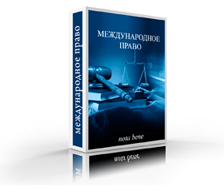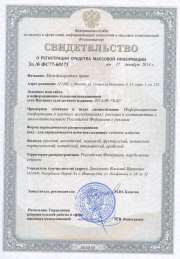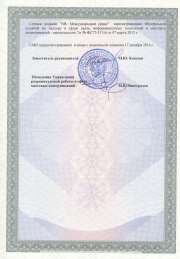MAIN PAGE
> Journal "International Law"
> Rubric "Question at hand"
|
Sazonova K.L. - International law and Ukrainian conflict: what was, what will be, and what the heart shall find its rest in.
|
|
pp. 1-15
|
DOI: 10.7256/2306-9899.2014.1.11666
Abstract: The Ukrainian crisis has been the subject of much discussion in the latest months. A large amount of information is provided, and the special attention is paid to the international legal aspects of the situation. At the same times, the references to the international law are being rather frivolous and they lack clear substantiation. Such references with rather relative understanding of the situation serve as grounds for speculations with international legal categories and terms. It seems necessary to clarify international stereotypes regarding international legal aspects of the Ukrainian events, which have formed in the latest months in the information zones both in Russia and abroad. The article uses materials and comments of both Russian and foreign international law scholars and politicians regarding the Ukrainian conflict within the framework of international law. The article may be divided into two relative parts. Firstly, the author generalizes the most popular techniques for the speculations with the term "international law" in the information sphere in the latest months. Then, the article provides legal evaluation of the six most popular international law theses regarding Ukraine and Crimea situation. Additionally, the author discusses the possible influence of the Ukrainian events on the further development of international law.

|
Korol'kova E.E. - The right to use force and the work of private military and security contractors in armed conflicts
|
|
pp. 1-7
|
DOI: 10.25136/2644-5514.2018.1.25464
Abstract: This article analyzed the interpretation of generally recognized principles of international law, such as the principle of sovereign equality of the states, principle of refraining from the threat or use of force in international relations, principle of non-intervention into internal affairs of other states in realization of the foreign policy. Using the example of the United States, in is demonstrated how with assistance of the private military and security contractors hired by the government for participation in the armed conflicts, they intervene into the internal affairs of other state, violating the aforementioned principles of international law. The author suggests to introduce the norm on assignment to the government of the actions of the private military and security contractors into the project of international convention on the work of private military and security contractors; prohibit the transnational corporations and other legal and private entities to hire them for realization of the tasks associated with the use of force in the armed conflict zone; establish the hiring mechanism for the private military and security contractors for execution of tasks in the foreign state territory exceptionally in accordance with the agreement of the receiving state.

|
Dimitrov N.S. - EU regulation in the area of acceptance and execution of court decisions in civil and business cases rendered in the EU member-states in the Republic of Bulgaria
|
|
pp. 1-11
|
DOI: 10.25136/2644-5514.2020.3.33066
Abstract: The subject of this research is the international legal acts in the area of acceptance and execution of decisions rendered by foreign courts, current procedural legislation of the Republic of Bulgaria, as well as research publications on this topic. The object of this research is the legal foundation and procedural actions in acceptance and execution of foreign court decisions on civil and commercial issues in the Republic of Bulgaria. The author carefully examines the rules directly related to execution and refusal to execute a court decision rendered in a member-state on the territory of Bulgaria. Special attention is given to the multiple issues pertaining to implementation of EU regulations recently passed in the area of EU civil process. Analysis of the positions dedicated to direct execution and refusal to execute a court decision is conducted in the context of the position of Brussels I Bis Regulation. The author makes following conclusions and recommendations: Bulgarian legislator needs to eliminate the difference between obligation to execute a foreign court decision and domestic court decision; it is necessary to amend the Civil Procedure Code of Bulgaria, as well as clarify the process of refusal to execute in accordance with the Article 47 of the Brussels I Bis Regulation. The author’s contribution into the research of this topic consists in the recommendation on improvements to the legal regulation and passing equal conditions for execution of foreign and national court decisions within the framework of the EU.

|
Sazonova K.L. - Responsibility of the states for the colonial era as the core trend of the modern international law discourse
|
|
pp. 25-41
|
DOI: 10.25136/2644-5514.2020.4.33309
Abstract: This article examines the international legal responsibility of modern states, which at some point used to be metropoles (mother country) before their former colonies, as well as analyzes the question of whether the centuries-old events can serve as the foundation for implementation of modern forms of international liability of the states. The subject of this research is the historical responsibility of ex-metropoles before their former colonies. The object of this research is the modern forms of international law, within the framework of which this responsibility can be exercised. The author comprehensively reviews the content of current claims of the former colonies, namely on the payment of reparations, admission of guilt, and issuance of formal apology by ex-metropoles. The conclusion is made that current claims of the former colonies emerged within the framework of global trend of recent time, associated with the attempt to view the international relations of past eras through the prism of modern legal and political paradigm, which differs significantly. For example, the modern political-legal paradigm relies on giving absolute priority to human rights and human life, which was uncharacteristic to the previous historical periods. Therefore, the attempts of current reconsideration of historical events, laying down the reparation demands, can lead to significant deterioration of modern intergovernmental relations, rather than improvement thereof.

|
Kolobov R.Y., Ditsevich Y.B. - The issues of international legal protection of the Lake Baikal: results of the 44th session of the World Heritage Committee
|
|
pp. 26-39
|
DOI: 10.25136/2644-5514.2021.3.36699
Abstract: The subject of this research is the decisions made at the 44th session of the World Heritage Committee in the matter of conservation of the World Heritage Site – Lake Baikal. Using the scientific methods of analysis, synthesis, etc., the author carries out in-depth analysis of the content of documents approved at the 44th session of the World Heritage Committee regarding the Lake Baikal held in July 2021, within the framework of which the international community estimates the discharge of obligations by the Russian Federation concerning the preservation of ecosystem of the Lake Baikal. The goal of this article is to explore and offer solutions to certain problematic aspects of international legal protection of the Lake Baikal in the context of discussion unfolded at the 44th session of the World Heritage Committee. The article examines the legislative changes in regulation of the various groups of social relations in the Central Ecological Zone of Lake Baikal and its islands, and formulates recommendations for their improvement. The author determines the non-systemic nature of legal regulation in this sphere, and this, inability to forecast changes in the regime of legal protection of the Lake Baikal. For solution of the indicated issue, the author formulates the proposal on the need to develop and approve the long-term management plan for the World Heritage Site “Lake Baikal” using approaches of the bodies of the system of world heritage protection. The development of such plan would be facilitated by extension of the umbrella regime of the listed territory to the Central Ecological Zone of Lake Baikal and its islands, as well as by creation of single administration that would also control other listed territories that are part of it. Analysis is conducted on the topical issues related to conservation of the Lake Baikal ecosystem, which were outlined at the 44th session of the World Heritage Committee. The author suggests a number of amendments to the federal legislation aimed at strengthening the national legal protection of World Heritage Sites.

|
Shinkaretskaya G.G., Berman A.M. - Cyber-attacks Ц an unlawful use of digital technologies
|
|
pp. 40-50
|
DOI: 10.25136/2644-5514.2022.1.37271
Abstract: This article notes that cyber-attacks, i.e. disruption of the information systems of persons, companies or countries, are a new type of criminal activity. International law does not yet have does not have normative documents that regulate the procedure of countering cyber-attacks. It is complicated by the fact that in the international law the grounds for taking coercive measures against other country is aggression (armed attack), which confers the right to individual or collective self-defense of the country. It is indicated that the doctrine legitimizes drawing parallels between common operation that are classified as the resorting to force, and the corresponding cyber operations. As the criterion of aggression, it is offered to use the assessment of the scale of attack and severity of consequences. The difficulty in qualifying the cyber-attack also lies in open architecture of the Internet, which allows billions of users worldwide to interact with each other. The aforementioned aspect also allows the hackers to hide their identity or even use someone else's device without their knowledge. All these difficulties aggravate if cyber operations are conducted by or on behalf of the countries. In fact, the cyber-attack participants do not bear any consequences for their actions. It is claimed that modern international law suggests both, intraterritorial or extraterritorial jurisdiction.

|
Belikova K.M. - The analysis of multilateral international regulation of foreign investments from the perspective of the УAsian Energy RingФ countries (China, South Korea and Japan)
|
|
pp. 41-52
|
DOI: 10.25136/2644-5514.2019.3.30537
Abstract: This article examines the approaches of the “Asian Energy Ring” countries towards international legal acts pertaining to foreign investment – Convention “On Settlement of Investment Disputes between States and Nationals of Other States” (Washington, 1965); Convention “Establishing the Multilateral Investment Guarantee Agency” (Seoul, 1985); OECD Draft Convention “On Foreign Property” (1967); and acts of the World Trade Organization (The General Agreement on Tariffs and Trade, etc.). The existing law enforcement practice is provided. The scientific novelty consists in the analysis of provisions of the aforementioned legal acts applicable to the their positions in the countries under consideration – China, South Korea and Japan. The following methods were used in the course of this research: general scientific, dialectical, historical, and comparative legal analysis. The author relies upon subjective-objective set of processes. The conclusion is made that the international legal acts are an effective mechanism for ensuring (for example, Seoul Convention) and protection (for example, Washington Convention) of the investors’ interests.

|
Fomina L.Y. - International standards of personal data protection in the conditions of information society
|
|
pp. 50-59
|
DOI: 10.25136/2644-5514.2019.4.31828
Abstract: This article is dedicated to the international standards of personal data protection in the conditions of information society. The author examines the international regulation on the questions of personal data protection, as well as the separate aspects of its implementation in the Russian law; analyzes the concept of personal data in accordance with the existing international act and documents in this sphere. The study also considers the key requirements that must be complied with in processing of personal data based on the existing international acts and documents, as well as responsibilities of the state aimed at ensuring their compliance. The rights and responsibilities of the subjects of legal relations emerging due to personal data protection are revealed. The author underlines the possibility of applicability of international norm protecting the private sphere to the protection of personal data, as well as distribution of the norms and recommendations onto the states that are not their members, along with citizens and organizations of such countries. The conclusion is made on the broad understanding of personal data in accordance with the existing international norms, primarily the Convention for the Protection of Individuals with regard to Automatic Processing of Personal Data, signed in 1981; need for demarcation of the pseudo-minimized and anonymous data; compliance with the minimum general requirements to the processing of personal data, and behavior of the subjects of such legal relations.

|






